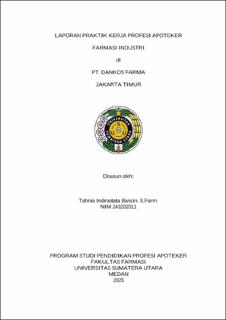| dc.description.abstract | Background: The pharmaceutical industry is a business entity that has a license in accordance with the provisions of the law to carry out activities related to the manufacture of drugs or drug ingredients. These activities must refer to the CPOB (Good Manufacturing Practices) guidelines. In the pharmaceutical industry, pharmacists, as key personnel, are responsible for three areas, namely manufacturing, quality control, and quality assurance. Therefore, the pharmaceutical industry must have at least three pharmacists to carry out drug manufacturing activities.
Purpose: This activity aims to provide prospective pharmacists with sufficient insight, knowledge, and practical experience about pharmaceutical work in the industry through the application of Good Manufacturing Practices (GMP). It also aims to improve prospective pharmacists' understanding of the roles, functions, and responsibilities of pharmacists in the pharmaceutical industry.
Summary: PKPA activities at PT. Dankos Farma included placement in the Penicillin department and understanding other departments in the industry through induction or training. Activities focused on the manufacturing process flow for beta lactam drugs, particularly penicillin products.
Conclusion: After conducting PKPA activities at PT. Dankos Farma, it can be concluded that pharmacists have roles and responsibilities as key personnel, including head of production, head of quality control, and head of quality assurance. In addition, PT. Dankos Farma has implemented good CPOB so that prospective pharmacists understand its application. The implementation of CPOB at PT. Dankos Farma covers aspects of quality management, personnel, buildings and facilities, equipment, sanitation and hygiene, production, quality control, self-inspection or quality audits, handling complaints about products, product recalls and product return documentation, as well as qualification and validation. This is evidenced by the acquisition of a CPOB certificate. | en_US |


